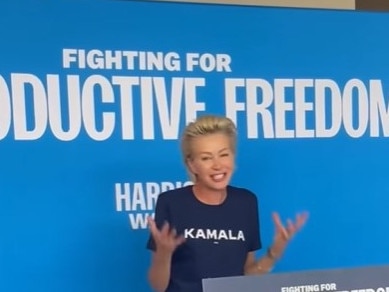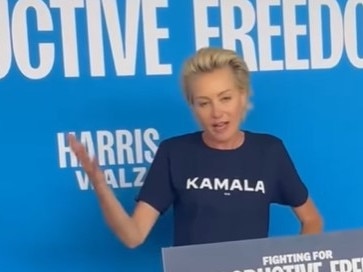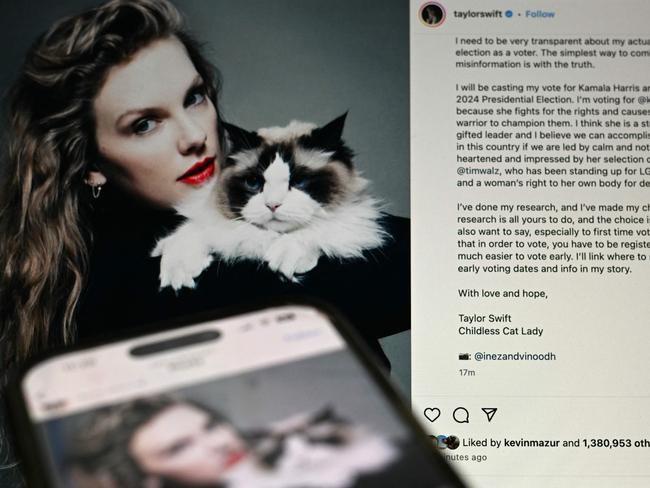Portia de Rossi and celeb mates inadvertently turned voters off Kamala Harris
An election analyst explains why celebrity endorsements, like that of an Australian Hollywood star, harmed rather than helped failed US presidential candidate Kamala Harris’ campaign.
World
Don't miss out on the headlines from World. Followed categories will be added to My News.
Celebrity endorsements, including the one from Australian actor Portia de Rossi, were the undoing of US Vice President Kamala Harris’ campaign according to a leading election analyst.
Wearing a “Kamala” T-shirt, Rossi addressed the Rochester Area Democratic Club in September along with her fellow castmates from the popular American political thriller TV series Scandal which ended in 2017.


Victorian born Rossi, who is married to former talk show queen Ellen DeGeneres, passionately spoke about the issue of reproductive freedom as being a key reason why she supported Harris.
“Why am I having to fight for basic human rights?” Rossi said.
“Why do we have to do this? It is so shocking to me that I have to fight for something that my mother took for granted, that my mother just didn’t even think about.
“The basic human right to do with your body as you choose, and to bring a human life into this world if you want to. Or if you don’t want to, you have the option not to.
“It just doesn’t even make sense to me.”

Rossi continued with what seemed to be the perfect pitch to undecided voters.
“I gotta say, you know, I understand certain values that Republicans hold,” Rossi said.
“But when it comes to just basic decency, basic dignity, basic human rights – the right to reproductive freedom – I do not understand. I just don’t.”
Political expert Alan Mendoza told the US Sun that while celebrities had the best of intentions, their endorsements rang hollow to voters.

“I think, in general, the concept of celebrity endorsements is quite ridiculous,” Mr Mendoza said.
“We think of celebrities obviously because they’re experts in their field, a singer, a football star, an actor.
“But their views on politics are no more interesting than my views on music, singing, or football.
“So for them to be held up by any candidate or any campaign as having some kind of special significance, is ridiculous.
“And the idea that we’re having Hollywood superstars or multi-billionaires telling us who should we vote for I think most ordinary people regard that as being actually offensive.”

While president-elect Donald had his own share of A-list supporters, they were dwarfed by the tide of celebrity backers who flocked to Harris.
Taylor Swift, George Clooney, Julia Roberts and Beyonce lead a list of stars who threw their support behind Harris’ failed campaign.
The concept of celebrity endorsements is foreign in Australia where both famous and ordinary citizens are much more likely to keep their political opinions to themselves.

A notable exception is Michael Caton, star of beloved Aussie underdog movie The Castle, who endorsed Sydney’s eastern suburbs Labor candidate Tim Murray in a previous federal election.
While Mr Murray’s campaign was not successful, that was not due to Caton’s endorsement – which was well received due to his status as a local icon – but rather because the seat of Wentworth has been embroiled in a vicious tussle between the LNP and the Teal Independents for years.
We locals need to stick together. Thank you Michael Caton for your endorsement today. Michael and I want to see a better climate policy, stronger education and better housing affordability. We had a lot of fun making a series of videos #WentworthVotespic.twitter.com/SJ61ToLRjM
— Tim Murray (@Timpmurray) October 3, 2018
Mr Mendoza believes that come the 2028 US election celebrity endorsements will be used a lot more sparingly.
“Actually, I think it does harm it as if you have a lot of endorsements it makes it seem as if your focus is on getting endorsements rather than getting votes,” Mr Mendoza said.
“(Harris) was dangling celebrities rather than policy and suggesting that because these people are voting for me, you should vote for me too.”




